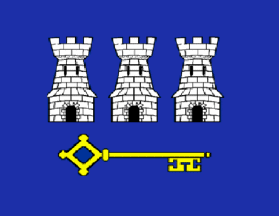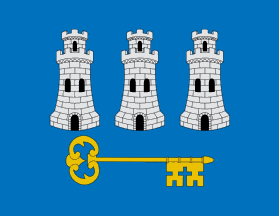 image by Olivier Touzeau, 6 February 2011
image by Olivier Touzeau, 6 February 2011
Last modified: 2025-02-07 by rob raeside
Keywords: cuba | havana | la habana | habana |
Links: FOTW homepage |
search |
disclaimer and copyright |
write us |
mirrors
 image by Olivier Touzeau, 6 February 2011
image by Olivier Touzeau, 6 February 2011
See also:
 image from wikipedia
image from wikipedia
Flag and Coat of Arms of Ciudad de la Habana are at wikipedia.
Felipe Casrillo, 25 March 2008
The Heralatin
website (original source for the Coat of Arms)
gives a description of the coat of arms, in Spanish, which I am
summarizing below.
According to research made in the 1930s by Dr. Ezequiel García
Enseñat, the coat of arms of Habana appeared in the first third
of the XVIIth century. The oldest written description of the arms
is a request submitted in 1665 by the Governnor and Captain
General of the island, Don Francisca Dávila Orejón Gastón, to
the King for the official grant of the arms used "desde
tiempo inmemorial" (from time immemorial). The document is
kept in the archives of the municipal museum of Habana.
Queen Regent Mariann of Austria confirmed the arms of Habana by
Letters Patented on 30 November 1665, which do not prescribe the
charges of the arms with precision. The arms of Habana were
eventually fixed in 1938 as follows:
"Usa de azur; tres
castillos de plata alineados en faja, cada uno almenado de cuatro
merlones y donjonado (torreado) de una torre de homenaje almenada
de tres merlones; el todo mazonado, y aclarado de sable. Debajo,
una llave de oro en la misma posición, con el anillo a diestra y
el paletón hacia abajo. Al timbre, corona mural de oro, formada
por un círculo murado con cuatro puertas (solo visible una al
centro y media en cada extremidad) y cuatro aspilleras (dos
visibles); y en un cuerpo superior, separado por un cordón, ocho
torres almenadas (cuatro visibles) unidas por lienzos de muralla
almenada. Como ornamento exterio, dos ramos de encina al natural,
una a diestra y otra a siniestra del escudo, cruzado bajo la
punta y atados de azur."
[Azure three castles argent placed
per fess [...] masoned and open sable a key or [...]. The shield
surmonted by a mural crown or [...] External ornament, two
branches of oak proper surrounding the shield and tied below by a
ribbon azure].
The Town of Havana became a Province in 1976. The provincial arms
were prescribed in the Regulations issued by the Provincial
Government in 1997.
The International
Civic Heraldry website, quoting Secundino Fernandez, adds
that the three castles represent the three old fortresses of
Havana (Fuerza, Morro and Punta); the key alludes to the
strategic location of the town on the Gulf of Mexico, symbolized
by the blue background.
Ivan Sache, 17 July 2007
I was in Cuba in November 2010 and saw there some interesting flags.
First stop in La Habana, where I could see the flag of the city.
The flag of La Ciudad de La Habana can be
seen next to a Cuban flag at the entrance of the Museum
of the city of Havana, where I was told by a guard that this is the official
flag of the city of La Habana. It is a blue swallow-tailed flag, with the city
coat of arms in the middle of the rectangular part, in 2 colours only (yellow on
blue), and with, in white narrow Sans-serif letters, the inscription "la Ciudad
de la Habana".
The flag has a golden-yellow fringe.
Olivier Touzeau, 6 February 2011
Slightly different version
 image by Poon Tat Ming William posted in I Love Flags on 16 March 2013
image by Poon Tat Ming William posted in I Love Flags on 16 March 2013
Flag of City of Havana, Cuba,
http://cgi.ebay.com/ws/eBayISAPI.dll?ViewItem&item=111032272412
Poon Tat Ming William posted in I Love Flags on 16 March 2013
I don't see the reported flag as the flag of Havana, but as a reproduction of
the drawing of the
"so-called-flag-of-Havana-shown-on-wikipedia-and-put-there-to-fill-the-field-"flag_of_Havana"-and-therefore-designed-as-a-banner-of-arms-since-it-would-be-a-good-idea-even-without-any-proof-of-the-existence-of-such-a-flag".
The only city flag I saw there is the one I sent to the list in February 2011.
The fact that I did not see the banner of arms does not mean that it does not
exist, but the flag I reported was described to me as the "official flag" of the
city of Havana.
Olivier Touzeau, 22 April 2013
havana.gif) image from wikipedia
image from wikipedia